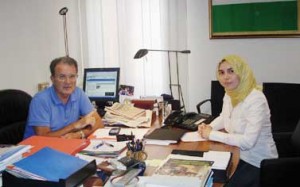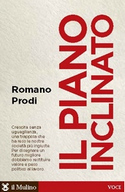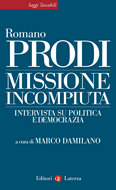Romano Prodi to «Al-Ahram»: Achieving positive results for the revolution in medium time range prevents a counter-revolution
 Romano Prodi to «Al-Ahram»: Achieving positive results for the revolution in medium time range prevents a counter-revolution
Romano Prodi to «Al-Ahram»: Achieving positive results for the revolution in medium time range prevents a counter-revolution
Hend Elsayed Hani interviews Romano Prodi on Al Haram Daily of July 20, 2011
(English translation from Arab kindly offered by Hend Elsayed Hani. Adapted and exclusively published here.)
Through out his presidency of the European Commission (1999-2004) and his office as the Prime minister of Italy (1996-1998 / 2006-2008), Romano Prodi witnessed a time when the tyranny was getting a solid ground in the Arab world, particularly south of the Mediterranean.
Both positions allowed him to approach many of the peoples in the region, sense their suffering and watch their economic conditions. His experience assured him that we are all in the same boat. If a hole occurs on one side, every one’s life is at risk. Now, after Prodi migrated from the world of politics, preferring to direct his effort to African issues, and after the collapse of figures that he dealt with for long time; Prodi – the thinker and the iconic economist of Italy- explores the horizons of the current situation as well as its challenges in an exclusive interview to Al-Ahram from the headquarter of the «Foundation for Worldwide Cooperation», which he presides in Bologna.
As the years of your presidency of the European Commission coincided with the reign of Mubarak in Egypt, Ibn Ali of Tunisia and Qaddafi in Libya and Assad in Syria, you had a view -by virtue of your office- on the details of the situation in those countries in that period, did you expect this change and those revolutions to happen?
I did not expect at all, I attended an informal meeting, months before the outbreak of the so called « Arab Spring», in which academics and former diplomats and experts of the region participated, but no one. I repeat, not one. No one thought of this happening. I remember we were discussing whether Mubarak’s successor will be his son Gamal ,or Omar Suleiman, and other things about the development and unemployment, but there was nothing to make us think about a change like this.
But were you aware of the suffering of the peoples?
During my mandate as President of the European Commission, we had to think about the people and I’ve always been a fighter for democracy, but when dealing with foreign countries we have to deal with them as they are without the complicity or counteracts, but frankly I always didn’t like the idea of sanctions, even in the most difficult cases, simply because behind any penalties hundreds of thousands or millions of people will suffer. So we had to push in the direction of development and of the country progress. I believe in the idea that developing countries and their progress over the long term lead to the transformation of democracy and we did not ignore the growing gap in those countries between the rich and the poor despite the development.
How do you see the repercussions of the Arab revolts at the regional level and internationally?
Today the answer to this question is not an easy matter because I do not consider that the Arab revolutions have ended , they are still going on. But first we have to ensure the success of these revolutions in the future, before we answer this question. We cannot ensure the success of these revolutions without an economic and social development in the revolting states. And I have a deep concern; I am trying to follow the conditions of the Egyptian economy every day and I find that unemployment is increasing , tourism is tragically low, exports are suffering a difficult situation , capital fleeing abroad and the banking system is having problems. What concerns me is that the revolution may stop in some way or appear weak. When a revolution erupts in such depth, you should achieve results for people and have new economic processes started. I believe that at the international level there is a big responsibility to help Egypt in its self recover. This is the first duty of the international community toward Egypt and must be done through actions aimed to help the Egyptian people in the process of democratization. Egypt is at a moment of change and of course suffers problems. The international community must develop a huge plan that we may call it «Marshall» or «Mediterranean plan» or whatever to restore recover quickly. This plan is urgent and requires funds far outweighting the potential of the Barcelona Process, which is slow and makes results in the long term. I think that there are about 12 European delegations taht went to Egypt to assess the situation, but there is a need to develop an emergency plan with a budget much larger than was announced. For example, there were a million Egyptians working in Libya and sending money to Egypt ; now they returned to their homes and are in need of money; can this situation continue for long? Of course not. I am totally different with my European colleagues because they did not understand how important is Egypt . Now I see that the European reaction is weak; this revolution needs strong help. it is the moment in wich it must be concrete the assistance of Europe to the peoples. Europe must help the young generations who made the revolution to hope in the future or they would otherwise be frustrated.
Do you see divisions among the Europeans , or between them and the United States on a strategy to deal with the new situation?
Yes there is not a common will, at least – and this is a difficult moment for Europe, the division was clear about Libya. Also, there is not a joint mobilization of the United States and Europe together or among the European countries themselves. All are working separately and all show their weakness.
How do you see the democratic transition process in the revolting countries, especially Egypt, and Tunisia, where the ruling regimes were overthrown?
I believe that a revolution succeeds, if the needs of the people are met. This is what I know with my experience. There cannot be an endless revolution, this it must give results, or there will be a counter-revolution and the country goes back again. If we look at history, any revolution succeeds if it achieves positive results during medium range of time – of course not extend to the years – but if there were negative results, the people would agree to any leadership that give them future perspective. Therefore, the resurrection of Egypt is necessary. The revolution of Egypt was made by Egyptian youth educated but unemployed. If they remained without jobs or the number of persons deprived of work grew , Egypt will go through a difficult time. And I always call to pay attention to Egypt, because for me; Egypt is the country that leads the change.
I’ve warned after the fall of Ben Ali in Tunisia, that if the same events broke out in Egypt, no one would know how things will be bloody , tragic and difficult given the size of Egypt. I think that the risk was there. When change like that occurs, one doesn’t know the human cost of it.
Is there any European opposition to the trial and jailing of Mubarak ?
I do not know. I think that justice must follow its own track, but with consideration to the future, not only to the past. We must think about the consequences in terms of the potential social and political tensions and the economy that people want to restore. I do not know the circumstances in which Mubarak settled in Sharm el-Sheikh, but in any case still Mubarak is on the Egyptian territories. We have to wait to see how things develop. I think that the issue of the trial is an Egyptian matter. I wait for the Egyptian decision, it is up to the Egyptians to choose what they want. when we overthrew the fascist regime of Italy, the decision was Italian. There is an Egyptian government that exercises sovereignty over the land of Egypt.
Italy is is the second trade partner to Egypt, what are the main challenges to economic relations between the two countries in light of the difficulties experienced by Egypt as well as the ungood economic situation of Italy?
Relations between the two countries took strong steps in the past. I remember that the first non-European immigrants who came to Italy were Egyptians (about 12 people), and were in my hometown «Reggio Emilia»in the seventies of the last century and they were skilled. But no one expected that this small number will turn into waves of migration. However; there must be a strong economic assistance to Egypt because the persistence of the poor economic conditions of Egypt as it is will threw the revolution in danger.
Frankly people always look with suspicion to the European aid and fear that behind it might be a desire to steer the country politically in a certain direction?
Well if you have that fear do it alone! But I am sure that under this difficult economic moment, you can’t be left alone. I am a primarily an economist. When I was President of the Commission I proposed building a ring of friends around Europe, and adopted a neighborhood policy to share the market, to be together in the adoption of immigration policy and to share everything except the institutions, so that none of these neighboring countries would be members European Union. And to approach more and more
but of course this needs time; may require 30 or 40 or 50 years to accomplish. We must start a policy sending the message that we are in the same area and to build trust, but of course, financial assistance is very important in the beginning. If we build trust the first thing we will do is stopping the massive fleeing from Egypt and stop all the negative aspects that always accompany revolutions. We must give a message that Egypt is close to the Renaissance. All of this will not be achieved only through economic instruments, but also political, the economy is a sign of political engagement. The political engagement in turn is an indication that you will maintain a long term approach to that State. So I say we need a strong and democratic Egypt as soon as possible. The Government of Egypt will be the new representative of Egypt for long-coming time. What I fear is the uncertainty.
The Italian media always warn about the possibility that “Radical Fundamental Isalmists” would take over power in Egypt and other revolting Arab countries. How do you see that? Do you welcome the dialogue with Islamists?
I think that the «Islamic extremism» will grow only if we abandon those countries. However, if we cooperate there will not be much space for extremists to spread and strengthen. If we will work hard for a new Egypt and we commit on it, extremism will not be there and vice versa.
How do you see the European stance towards the atrocities committed in Syria? Do you think that the Assad regime will be able to survive or be overthrown?
I think that what is going on in Syria is closely related to what happened in Tunisia and Egypt, but is difficult to predict its outcome. I believe that it is difficult to add to the Europeans a new problem for them while they are in action in Libya, there are many difficulties facing the problem of Libya. At the same time european forces suffer over stretching. Libya is geographically closer to Europe and the Syrian case – compared to Libya – is more complex because of its proximity to Iraq and Iran and the surrounding environment. It may be also because of Israel and the Golan Heights.
How do you see the repercussions of declaring a Palestinian state?
I think it has to be declared a state, but the consequences will vary based on the degree of Palestinian unity. The divisions among the Palestinians will make the achievement of the state much more difficult.
By virtue of your interest in Africa, how do you see the future of the Nile’s water crisis?
I think that the problem of the Nile will become tragic in few years. Ethiopia besides another 6 or 7 other countries want a bigger share of water, Egypt as well it needs more water. What we need in this case is a very large project to rationalize water consumption with modern technology, including pipes to pump, rain water irrigation. This technology will increase the water consumption up to 10% of the amount consumed now. The problem here is not only political but also economic, because the Nile Basin countries
now need more water.
Somebody looks to Berlusconi as the «founder» of the Second Republic in Italy , seeing that he has put the rules of the game of it, Do you agree?
I do not agree on that. We can’t consider a man who does not respect the rules the founder of the second Republic. He did not create any new political elite, but he just runs Italy on personal interests.
After the fall of Ben Ali and Mubarak, demonstrations took place in front of Villa Arcore of Berlusconi and other areas, calling upon him to leave and catch up with them .. Do you see that the Arab revolutions inspired the Italians in some way?
We have elections, and I believe that Berlusconi will be defeated in the next elections. He will be outthrown not because of his announcement that he won’t be a candidate again, but because of his failure to fulfill his promises.
Do you have any plans to resume your political career?
I don’t intend that. I have succeeded in all elections I’ve run (1996 -2006) through the Olive Tree coalition , and I believe that it was the only solution able to afford sucesfully Italian problems. But I had lost power due to a split in the coalition and now I’m concentrating on efforts to help Africa and the cooperation of African countries. I also give university lectures in China and in the United States. I’m no longer in Parliament and I’m not working on italian politics , but simply I support the Democratic Party because it is the only serious alternative fit to replace Berlusconi’s coalition.






















